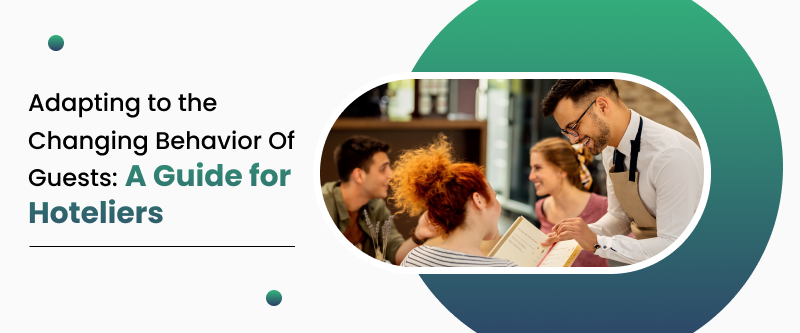Running a hotel is a fantastic journey, but it also requires you to stay on your toes as the hospitality landscape continuously evolves. One of the keys to staying ahead in this dynamic industry is to understand the changing guest behaviour. As society undergoes profound changes, so does the behaviour of consumers, and this transformation has a significant impact on hotels.
The way people book hotel rooms, what they expect during their stay, and even how they want to be treated is evolving. So, what’s the deal, you ask? Well, by understanding and adapting to those changes you’ll not only meet but exceed your guests’ expectations.
More than that, it opens up a world of opportunities for your business to grow. Curious about how? Look no further because we’ve got you covered in this blog.
We’ll delve into how these shifts in guest behaviour can impact your hotel business and, most importantly, how you can transform these changes into opportunities that will make your hotel shine.
Table of Content
- The Changing Consumer Behavior in hospitality
- The Rise of Online Booking
- Demand for personalization
- Sustainibility Matters
- Technology Integration
- Alternative Accommodations
- Social Media Influence
- Health and Safety Concerns
- Blurring Lines Between Work and Leisure
- Rising Trend of Micro-Travel
- Flexible Booking Options
- Feasibility of Adapting to Changing Consumer Behavior for Hotels
The Changing Consumer Behavior in Hotel Industry
Consumer behaviour in the Hospitality Industry has undergone significant transformations in recent years. These changes have been influenced by a variety of factors, including advances in technology, socio-cultural shifts, and global events like the pandemic.
Guests no longer seek just a bed and a roof over their heads. They now expect a personalized and seamless experience from the moment they start searching for a hotel. These expectations are often shaped by their online interactions and previous hotel stays. The key to meeting these expectations lies in understanding the guest’s psychology and adapting accordingly.
Let’s explore some of the key impacts these shifts are having on hotels:
- The Rise of Online Booking:
Remember the time when you had to call hotels to book a room? Well, with the evolution of technology, things have changed a lot. In today’s digital age, we all know that travellers are more likely to grab their smartphones and start searching for the perfect hotel online.
In response, it’s crucial to establish a strong online presence. Invest in a user-friendly website that works seamlessly on mobile devices. Consider collaborating with online booking platforms to expand your reach and cater to the modern traveller’s needs.
According to Hotel Mize, online travel agencies (OTAs) accounted for 40% of global hotel bookings in 2023. At the same time, online reviews and ratings have become more influential in shaping travellers’ decisions and expectations, as they seek to hear from other guests about their experiences with a hotel’s service, brand, product, or value.
- Demand for Personalization
Guests now expect a more personalized experience during their stay, from tailored room amenities to personalized recommendations for dining and activities. They crave a personalized touch that makes their stay unique and memorable. As hoteliers, it’s your job to cater to this desire.
Getting to know your guests’ preferences can help tailor their experiences. To achieve this, what you can do is invest in data analytics to understand your guests better. Create guest profiles and utilize loyalty programs to tailor their experiences. From room amenities to local recommendations, a personalized touch can go a long way in earning guest loyalty.
- Sustainability Matters
We all are aware of the environmental damage that has happened in the last few decades. That said, travellers are more eco-conscious than ever. Many guests actively seek eco-friendly accommodations that align with their values. So, what can you do to go green?
Implement eco-friendly practices like reducing waste and conserving energy. Highlight your sustainability efforts to attract environmentally-conscious guests. By going green, you not only help the planet but also build a reputation as a responsible hotel.
- Technology Integration
Technology has become an integral part of our lives. These days, guests expect technology-driven conveniences, such as preferences for contactless check-in, keyless entry, a good Wi-Fi connection and smart room controls.
Investing in technological infrastructure to offer these services, not only enhances your guest experiences but improves operational efficiency. Keeping pace with technological advancements ensures your hotels remain competitive, attract tech-savvy travellers, and deliver the convenience and connectivity guests now demand.
- Alternative Accommodations
Changing consumer behaviour in choosing alternative accommodations in the hospitality industry is marked by a significant shift away from traditional hotels. Travelers increasingly opt for alternative options such as vacation rentals, hostels, boutique inns, and even home-sharing platforms like Airbnb.
To compete, hotels are diversifying their offerings, focusing on unique experiences, and digital convenience and redefining their value proposition to differentiate themselves from the competition.
Social media’s importance in consumer-changing behaviour cannot be overstated. In today’s digital age, social platforms are where people share experiences, read reviews, and make decisions. Modern travellers usually expect quick responses to their inquiries, and insights into the guest experience.
“A study by TripAdvisor found that 72% of travellers are more likely to book a hotel that has positive reviews on social media.”
Social proof in the form of positive reviews and visually appealing content plays a vital role in their hotel selection process. To align with these expectations, you can actively engage with guests on social media, encourage user-generated content, and respond to reviews.
By embracing social media, hotels can shape perceptions, attract potential guests, and build trust in an increasingly interconnected world. In short, social media isn’t just a tool; it’s a cornerstone of modern consumer behaviour and hotel success.
- Health and Safety Concerns
The pandemic has heightened guest concerns about health and safety, making these factors one of the top priorities when selecting accommodations.
As a hotelier, it’s more of a responsibility to align with these expectations to maintain a healthy environment at your property. Implement cleaning protocols, promote transparency about safety measures to guests, and ensure staff are well-trained. By prioritizing health and safety, hotels can build trust with guests, reassure them and enhance the overall guest experience.
- Blurring Lines Between Work and Leisure
Modern travellers value work-life balance and they like to embrace the concept of “bleisure” travel, a trend where work-related trips seamlessly blend with vacation experiences.
Hotels are proactively adapting to this evolving landscape by offering flexible workspaces, high-speed internet access, and business-friendly amenities. This accommodation evolution caters to the needs of travellers who desire a harmonious balance between their professional commitments and the opportunity to unwind and explore new destinations, all within the confines of their hotel stay.
- Rising Trend of Micro-Travel
Have you ever felt the need for a quick escape, a short trip to unwind and recharge? Many of us have, especially in the last couple of years.
It turns out that more and more people are taking short trips, known as micro-travel, within a few hours’ drive from their homes. Instead of staying in big city hotels, many are choosing to book stays at caravan parks, holiday parks, eco-lodges, or small hotels in quieter areas. These places are becoming more popular because people want to get away from crowded places.
To attract these micro-travellers, hotels and lodges can use special advertising campaigns. They can target people who live nearby or show interest in similar places on social media. This way, they can offer them the right deals and options for their short getaways.
- Flexible Booking Options
Travel plans can be unpredictable, and last-minute changes might happen. So, today’s travellers value the freedom to modify reservations and seek options that accommodate their uncertainties.
This flexibility is essential not just for guests but also for hotels themselves. It may seem like offering such flexibility could lead to losses due to empty rooms.
To align with these expectations and avoid such losses, you can provide flexible booking policies, clear communication, refundable rates, and loyalty rewards. In this dynamic industry, flexibility is key to influencing consumer behaviour and ensuring long-term success.
Feasibility of Adapting to Changing Consumer Trends for Hotels
Adapting to changing consumer behaviour can be a challenging task for hotels, but it’s not impossible. The feasibility of aligning with these changes depends on various factors such as:
- Resources & Financial Considerations
Adapting to evolving consumer behaviour often requires significant financial investments. Upgrading technology, implementing sustainability initiatives, and providing personalised services can be costly. Hotels must assess their budget and financial stability to determine the feasibility of these changes.
Hotels might need to allocate resources, both financial and human, to implement the necessary changes. Investing in technology upgrades, sustainability initiatives, and staff training is essential. The feasibility of these investments depends on the hotel’s financial health and long-term strategy.
- Target Market
Understanding the preferences of your target market is essential. If your guests prioritize eco-friendliness, investing in sustainability measures makes sense. However, if your guests seek affordability, high-tech amenities may not be a priority. Hotels should tailor their offerings to match the needs and preferences of their specific guest demographics.
- Competition
The competitive landscape matters. Hotels facing stiff competition are more likely to adapt to stand out, while those in less competitive markets may not feel the same pressure. In less competitive markets, hotels should focus on differentiating themselves through exceptional service, unique packages, or special promotions.
- Guest Feedback and Monitoring
Continuous monitoring of guest feedback and behaviour is essential. You must be prepared to adjust your strategies based on ongoing feedback and market dynamics.
Listening to guest opinions and preferences can help hotels prioritize which changes are most important and which may not align with their target audience.
- Return on Investment (ROI)
Hotels should assess the potential ROI for each change. Some investments may have a more immediate impact on revenue and guest satisfaction, while others may be long-term strategies with delayed returns. Evaluating the expected ROI is essential for prioritizing initiatives.
- Long-term Vision & Adaptability
Hotels should adopt a flexible approach to adaptation. Consumer behaviour may continue to evolve, and hotels must be agile in responding to these changes. Regularly evaluating the feasibility and impact of new adaptations is crucial for long-term success.
Conclusion
Change is inevitable, but it can also be a catalyst for growth. Changes in consumer behaviour in the hotel industry have a profound impact on hotels, reshaping the way they operate and interact with guests.
As a hotelier, it is crucial to understand and adapt to these changes to remain competitive and meet guest expectations. By staying flexible, responsive, and attentive to evolving preferences, you’ll not only adapt to change but also harness it for the continued success and growth of your hotel business.
So, keep an open eye on changing guest preferences, adapt with grace, and watch your hotel flourish in the ever-evolving world of hospitality.



